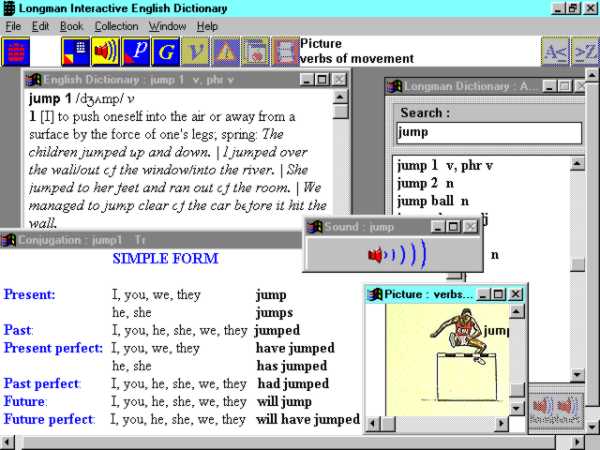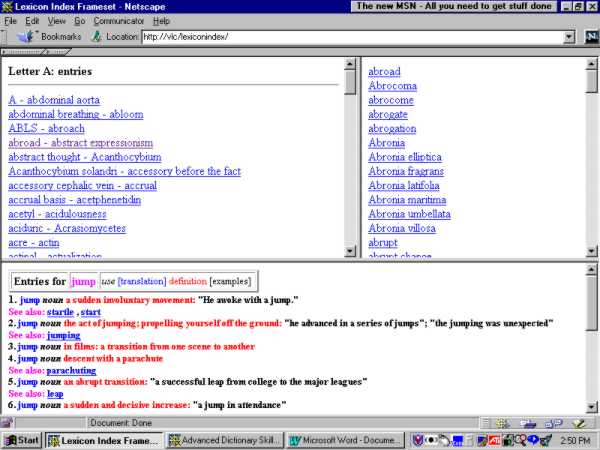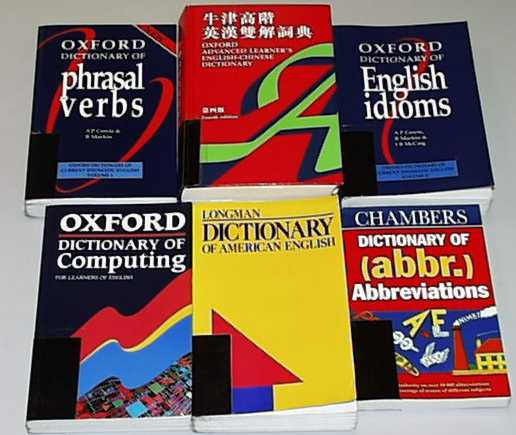Find out which kind of dictionary is suitable for
you. Please choose an option:
|
Books |
CD-ROMS |
Internet |
| Advantages |
|
- Fast retrieval
- Lots of information
- Light-weight
- Small size
- Some contain pronunciation files
- Some contain English learning materials
- Some contain lots of pictures
|
|
| Disadvantages |
- Large size
- Slow retrieval
|
- Computer needed
- Slower retrieval process if users are computer dummies
- Some are not well-designed
|
- Computer needed
- Internet connection needed
- Slow internet speed
- Free ones often have advertising
|
If you have any suggestions or questions, please fill in
a feedback form or e-mail the Webmaster.
Books
Advantages:
- Familiarity - you have very probably used a book dictionary before.
- Ownership - you've probably got one already, so you don't need to buy one.
Disadvantages:
CD-ROMs
You can buy dictionaries on CD-ROM.
Advantages:
Disadvantages:
- You need a computer
- It takes longer to start your computer, start the dictionary program and
look up the word than it does to use a paper dictionary. If you are already using the
computer however, this is not really a problem
- Some CD ROMs are not well-designed as they seem not to use the abilities
of computers (e.g. hyperlinking) very well
- Due to the above disadvantages you should test the CD before you buy it,
though not all shops will allow this. Of course, you can always come to CILL and try it.
Here is a screen shot from the Longman
Interactive CD-ROM dictionary, showing a definition, a sound recording, a picture and
some grammatical information.
Internet
You can find some dictionaries on the Internet, click here for some examples.
Advantages:
- They are free.
- Wild cards - you can type ? if you don't know a letter,
or * for a group of letters you don't know; e.g. b?t will find bat, bet, bit,
& but. b*t finds babysit, backseat, bait, ballet etc.
Disadvantages:
- You need a computer
- You need to be connected to the Internet
- The Internet might be very slow
- Some have distracting advertising
Here is a screen-shot of the Virtual Language Centre's
on-line lexicon:
General Dictionaries
These are normal dictionaries that give you information about the most common words in
English. However, new words are often not included in these dictionaries until they become
very common. Therefore you should look for new fashionable words and new technical words
(especially computer terms) in a dictionary of slang or informal expressions or in a
technical dictionary.
Here are some of CILL's general dictionaries:
Specialised Dictionaries
These are dictionaries with words useful for special groups of people, for example:
- Learner's dictionaries, for people learning a language
- Bi-lingual dictionaries, for translating between languages
- Technical dictionaries for professionals; e.g. medical and computer dictionaries
- Thesauruses, which are dictionaries that list words with similar meanings together. This
is useful for writing, where it is sometimes bad style to use the same word many times.
However, you will need to use a normal dictionary to discover the differences between the
similar words. Some word-processing programs have a thesaurus in the Tools menu.
- Dictionaries that concentrate on one part of language, such as dictionaries of idioms or
collocations.
- Dictionaries that translate between varieties of a single language, for example,
British-American dictionaries. In Hong Kong we usually use British English; e.g. we say
"pavement", while Americans say "sidewalk". If you are going to
America to study you will need to learn the American word. You will also need a dictionary
of American English, rather than one of British English.
Here is a photo of some of these specialised dictionaries:



